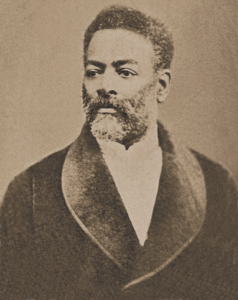
Luís Gama
*Luís Gama was born on this date in 1830. He was an Afro Brazilian self-taught lawyer, abolitionist, orator, journalist, and writer. He was a black intellectual in 19th-century slave-owning Brazil who spent his life fighting for the abolition of slavery and for the end of the monarchy in Brazil.
Luís Gonzaga Pinto da Gama was born in Salvador, Bahia. Even with little information about his childhood, he was the son of Luísa Mahin, a freed African ex-slave and the white son of a Portuguese fidalgo. At seven, his mother traveled to Rio de Janeiro to participate in the Sabinada revolt, never to see him again. In 1840, his father, in debt, resorted to selling Luís Gama as a slave to pay his debts. There is no evidence that his father sought him out after that.
As an adult, Gama understood that when he was sold, he was a victim of the crime of "Enslaving a free person, who is in possession of his freedom.", provided in Article 179 of the Criminal Code of the Empire of Brazil, sanctioned shortly after his birth. Furthermore, because the revolts that took place in Bahia led to the prohibition of the sale of slaves from this province to other regions of Brazil, the sale and transport of Luís Gama to São Paulo was constituted as contraband. Put up for sale; he was rejected "for being Bahian."
After the Malê revolt, a stigma was created that Bahian captives were rebellious and more likely to run away. He was taken to Rio de Janeiro, where he was sold to Antonio Pereira Cardoso and resold in São Paulo. From the Port of Santos, all the buyers resisted buying him because he was from Bahia; Gama began working as a domestic slave on the ensign's property, washing and ironing clothes, and then as a seamstress and shoemaker in Lorena. In 1847, Gama learned the alphabet. The following year, Gama became literate and taught children to read. With this, Gama proved his freedom and joined the army in 1848; in 1850, he married Claudina Fortunata Sampaio.
He was part of the City Guard until 1854 and a copyist for official authorities in his spare time. In 1856, he was hired as a clerk at the São Paulo Police Department, in the office of a counselor and law professor. He judicially won his freedom and began to work as a lawyer on behalf of the captives, and by the age of 29, he was already an established author. His only authored work, Primeiras Trovas Burlescas, was dedicated to Salvador Furtado de Mendonça, a magistrate, and he has poems by his friend José Bonifácio. São Paulo, where Gama lived for forty-two years, was a small provincial capital that, with the demand for coffee production from the 1870s on, saw the price of slaves reach a level that made their urban possession almost prohibitive. Until this period, however, it was pretty standard the property of "rent slaves," on whose work their owners drew their source of sustenance, alongside the so-called "domestic slaves."
It had a powerful presence in legal culture because, since 1828, one of the only two law schools in the country had been established there, the Largo de São Francisco Law School, which received students from all over the country from all social strata. Gama abhorred African descendants who acted like whites or even became cruel slavers, and he was perplexed to see nonwhite slavers trying to pass themselves off as whites. Later, Gama was part of the group that, for the first time, tried to create a republican party. On July 2, 1873, he participated in the First Republican Congress, already part of the Paulista Republican Party, where he found that the party and its members, many slave owners, did not care or interest themselves in the abolitionist agenda. The writer, Raul Pompeia, had already noticed that Gama's health was not good. Luis Gama had diabetes.
On the morning of August 24, 1882, he lost his speech and died that afternoon. In 2018, his name was inscribed in the Steel Book of National Heroes deposited in the Tancredo Neves Pantheon of the Fatherland and Freedom.